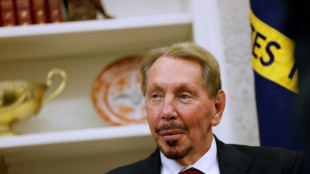
-
 Pandya blitz powers India to T20 series win over South Africa
Pandya blitz powers India to T20 series win over South Africa
-
Misinformation complicated Brown University shooting probe: police

-
 IMF approves $206 mn aid to Sri Lanka after Cyclone Ditwah
IMF approves $206 mn aid to Sri Lanka after Cyclone Ditwah
-
US halts green card lottery after MIT professor, Brown University killings

-
 Stocks advance as markets cheer weak inflation
Stocks advance as markets cheer weak inflation
-
Emery says rising expectations driving red-hot Villa

-
 Three killed in Taipei metro attacks, suspect dead
Three killed in Taipei metro attacks, suspect dead
-
Seven Colombian soldiers killed in guerrilla attack: army

-
 Amorim takes aim at Man Utd youth stars over 'entitlement'
Amorim takes aim at Man Utd youth stars over 'entitlement'
-
Mercosur meets in Brazil, EU eyes January 12 trade deal

-
 US Fed official says no urgency to cut rates, flags distorted data
US Fed official says no urgency to cut rates, flags distorted data
-
Rome to charge visitors for access to Trevi Fountain

-
 Spurs 'not a quick fix' for under-fire Frank
Spurs 'not a quick fix' for under-fire Frank
-
Poland president accuses Ukraine of not appreciating war support

-
 Stocks advance with focus on central banks, tech
Stocks advance with focus on central banks, tech
-
Amorim unfazed by 'Free Mainoo' T-shirt ahead of Villa clash

-
 PSG penalty hero Safonov ended Intercontinental win with broken hand
PSG penalty hero Safonov ended Intercontinental win with broken hand
-
French court rejects Shein suspension

-
 'It's so much fun,' says Vonn as she milks her comeback
'It's so much fun,' says Vonn as she milks her comeback
-
Moscow intent on pressing on in Ukraine: Putin

-
 UN declares famine over in Gaza, says 'situation remains critical'
UN declares famine over in Gaza, says 'situation remains critical'
-
Guardiola 'excited' by Man City future, not pondering exit

-
 Zabystran upsets Odermatt to claim first World Cup win in Val Gardena super-G
Zabystran upsets Odermatt to claim first World Cup win in Val Gardena super-G
-
Czechs name veteran coach Koubek for World Cup play-offs

-
 PSG penalty hero Safonov out until next year with broken hand
PSG penalty hero Safonov out until next year with broken hand
-
Putin says ball in court of Russia's opponents in Ukraine talks

-
 Czech Zabystran upsets Odermatt to claim Val Gardena super-G
Czech Zabystran upsets Odermatt to claim Val Gardena super-G
-
NGOs fear 'catastrophic impact' of new Israel registration rules

-
 US suspends green card lottery after MIT professor, Brown University killings
US suspends green card lottery after MIT professor, Brown University killings
-
Stocks mixed with focus on central banks, tech

-
 Arsenal in the 'right place' as Arteta marks six years at club
Arsenal in the 'right place' as Arteta marks six years at club
-
Sudan's El-Fasher under the RSF, destroyed and 'full of bodies'

-
 From farms to court, climate-hit communities take on big polluters
From farms to court, climate-hit communities take on big polluters
-
Liverpool have 'moved on' from Salah furore, says upbeat Slot

-
 Norway crown princess likely to undergo lung transplant
Norway crown princess likely to undergo lung transplant
-
Iraq negotiates new coalition under US pressure

-
 France's budget hits snag in setback for embattled PM
France's budget hits snag in setback for embattled PM
-
Putin hails Ukraine gains, threatens more, in annual press conference

-
 US suspends green card lottery after Brown, MIT professor shootings
US suspends green card lottery after Brown, MIT professor shootings
-
Chelsea's Maresca says Man City link '100 percent' speculation

-
 Dominant Head moves into Bradman territory with fourth Adelaide ton
Dominant Head moves into Bradman territory with fourth Adelaide ton
-
Arsenal battle to stay top of Christmas charts

-
 Mexican low-cost airlines Volaris and Viva agree to merger
Mexican low-cost airlines Volaris and Viva agree to merger
-
Border casinos caught in Thailand-Cambodia crossfire

-
 Australia's Head slams unbeaten 142 to crush England's Ashes hopes
Australia's Head slams unbeaten 142 to crush England's Ashes hopes
-
Epstein files due as US confronts long-delayed reckoning

-
 'Not our enemy': Rush to rearm sparks backlash in east Germany
'Not our enemy': Rush to rearm sparks backlash in east Germany
-
West Indies 110-0, trail by 465, after Conway's epic 227 for New Zealand

-
 Arsonists target Bangladesh newspapers after student leader's death
Arsonists target Bangladesh newspapers after student leader's death
-
Volatile Oracle shares a proxy for Wall Street's AI jitters


German parliament to vote on huge spending boost for defence, infrastructure
German lawmakers will vote Tuesday on a massive spending boost for defence and infrastructure proposed by chancellor-in-waiting Friedrich Merz amid concern over the United States' commitment to Europe's security.
The hastily drawn plans represent a radical departure for a country traditionally reluctant to take on large amounts of debt or to spend heavily on the military, given the horrors of its Nazi past.
But Merz, 69, whose conservative CDU/CSU alliance won an election last month, has urged swift action as concerns grow that the United States' decades-old commitment to European defence is faltering under President Donald Trump.
In an interview with public broadcaster ARD on Sunday, Merz said the "situation has worsened in recent weeks", citing Trump's overtures to Russia to end the Ukraine war and his wavering commitment to NATO.
"That is why we have to act fast," Merz said.
Merz's plans envisage exempting defence spending from the country's strict debt rules when it exceeds one percent of GDP and setting up a 500-billion-euro ($545-billion) fund for infrastructure investments.
As well as boosting domestic investments, the spending package -- dubbed a fiscal "bazooka" by German media -- would free up an extra three billion euros ($3.3 billion) of support for Ukraine in 2025.
Outgoing Foreign Minister Annalena Baerbock said the plans were a "strong signal that Germany is serious about its own security, about the security of Ukraine and about the security of Europe".
The massive funding boost represents "a fiscal sea change for Germany," wrote Holger Schmieding of Berenberg Bank.
He added that Merz and his team "are rising to the challenges which Germany is facing in times of almost unprecedented geopolitical upheaval for Europe".
- Political limbo -
Germany is currently in political limbo, with Merz embroiled in negotiations to form a coalition with the Social Democrats (SPD) of outgoing Chancellor Olaf Scholz.
The conservatives and the SPD agreed the plans to boost the country's under-resourced military and ailing economy as part of their initial coalition talks in early March.
But instead of waiting until the new government is formed, the parties want to get the spending plans approved by the outgoing parliament, which remains in place until next week.
In the next chamber, the far-right Alternative for Germany (AfD) and the far-left Die Linke -- which both oppose the plans -- would have the numbers needed to block them.
Even in the outgoing parliament, the CDU/CSU and SPD are relying on the support of the Greens to help them reach the two-thirds majority required to modify the debt brake.
The Greens had threatened to withhold their support, but a deal was struck late last week with Merz agreeing that 100 billion euros of the infrastructure fund will be dedicated to climate-protection measures.
Merz on Monday said he was "confident" the plans would be voted through on Tuesday.
The deal hangs on a margin of 31 votes, according to Der Spiegel magazine, which warned that "some departing parliamentarians could take the opportunity to get back at the new government with a no vote".
Ursula Muench, director of the Academy for Political Education, said there was still "significant uncertainty" around the vote.
A failure to achieve the required majority would be a "debacle for the coalition in the process of being formed... and ultimately for Friedrich Merz," she said.
The measures must also still be voted through the Bundesrat, the upper house of parliament, on Friday, where they also require a two-thirds majority.
Coalition negotiations often last several weeks, or even months, in Germany. But Merz has set out an ambitious schedule to have a government in place by Easter or soon after.
If all goes according to plan, the new parliament will vote on whether to appoint him as chancellor on April 23.
E.Schubert--BTB
